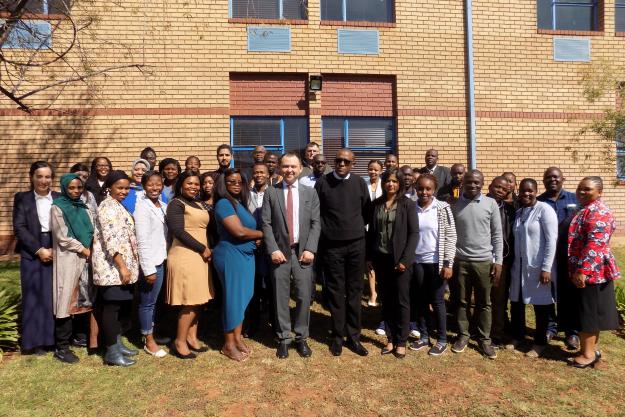
THE HAGUE, Netherlands – 24 May 2019 – Chemistry professionals from African Member States of the Organisation for the Prohibition of Chemical Weapons (OPCW) upgraded their chemical analysis skills during an Analytical Chemistry Course (ACC) held in Pretoria, South Africa from 13 – 24 May.
The participants were welcomed by Non-Proliferation Technical Adviser from the South Africa Council for the Non Proliferation of Weapons of Mass Destruction, Mr Matome Mookodi; Technology Area Manager of Protechnik Laboratories, Dr Thokoza Bhengu; and Senior Programme Officer from the OPCW Technical Secretariat, Dr Sergey Zinoviev.
In his opening remarks, Mr Mookodi expressed his wish that the participants “not only learn a lot, but also exchange experience in advanced analytical techniques to stimulate knowledge-sharing among scientists.” The value of international cooperation and dissemination was also noted by Dr Bhengu who highlighted the importance of participants’ active multi-stakeholder engagement.
The course participants deepened their knowledge about sample preparation, quality control, health and environmental issues related to toxic chemicals, physical properties of chemical warfare agents, and national implementation of the Chemical Weapons Convention (CWC).
In addition to theoretical knowledge, the course offered intensive practical exercises in the preparation of different sample matrices for subsequent analysis by gas chromatography (GC) with element-selective detectors and gas chromatography-mass spectrometry (GC-MS). Participants also received training on the application of GC and GC-MS for the analysis of chemical samples in relation to the CWC.
The course also provided a platform for participants to exchange their individual work experiences and challenges in GC and GC-MS techniques, including hardware, instrument testing and optimisation, and basic instrument maintenance and troubleshooting.
The course, whose curriculum is modelled on the reputable Analytical Skills Development Course (ASDC) provided by VERIFIN Institute in Finland, has been held annually since 2009 to better support National Authorities in implementing the CWC.
The programme welcomed 22 participants from: Algeria, Burkina Faso, Cameroon, Kenya, Lesotho, Malawi, Morocco, Nigeria, Sudan, Tanzania, Uganda, Zambia, Zimbabwe, and South Africa.
The event was organised by the OPCW and Protechnik Laboratories of Armscor (Armaments Corporation of South Africa).
Background
The Analytical Chemistry Courses are designed to build and extend the capacity of laboratories in the countries in Africa to analyse chemicals relevant to the Chemical Weapons Convention (CWC).
The courses are part of a larger OPCW’s Africa Programme that strives to strengthen the Organisation’s cooperation with its Member States from Africa.
Established in 2007, Africa Programme aims to respond to the particular needs of African countries. The activities include capacity building and raising awareness of the CWC, through cooperation with the African Union and outreach to civil society and academic institutions.
The Components of an Agreed Framework for the Full Implementation of Article XI were established by the decision of the Conference of States Parties in 2011.
As the implementing body for the Chemical Weapons Convention, the OPCW, with its 193 Member States, oversees the global endeavour to permanently eliminate chemical weapons. Since the Convention’s entry into force in 1997, it is the most successful disarmament treaty eliminating an entire class of weapons of mass destruction.
Ninety-seven percent of all chemical weapon stockpiles declared by possessor States have been destroyed under OPCW verification. For its extensive efforts in eliminating chemical weapons, the OPCW received the 2013 Nobel Peace Prize.
